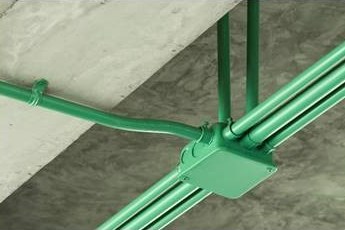Cortec Coating Protects Electrical Units From Corrosion, Rusting
Cortec’s EcoShield VpCI-386 HT Slip Coating is said to offer extended protection in sheltered, unsheltered, indoor or outdoor conditions and is UV resistant from cracking, chipping and prolonged exposure to sunlight.

Cortec’s new EcoShield VpCI-386 HT Slip Coating provides a way to keep the inside of electrical conduits from rusting while providing enough slip for electrical wires to pass through.
EcoShield VpCI-386 HT Slip Coating is a high-heat-resistant, water-based direct-to-metal (DTM) coating that reportedly offers improved surface slip, excellent outdoor weathering and thermal heat protection. According to Cortec, the coating significantly retards the reaction of metal ionization and repels water, which protects against corrosive electrolytes and aggressive environments. This thixotropic coating resists sagging and running and is thermally stable when dried in ambient temperatures up to approximately 500°F (260°C), depending on color choice (clear, black or aluminum). EcoShield VpCI-386 HT Slip Coating is said to offer extended protection in sheltered, unsheltered, indoor or outdoor conditions and is UV resistant from cracking, chipping and prolonged exposure to sunlight.

By combining a slip coating with Cortec VpCI corrosion inhibitors, EcoShield VpCI-386 HT Slip Coating helps electrical conduit manufacturers and users tackle two challenges at once, according to Cortec. Many tube makers must briefly expose piping to extreme heat during the manufacturing process; for example, to cure coatings. EcoShield VpCI-386 HT Slip Coating is designed to withstand high temperatures.
In addition, Cortec says its Micro-Corrosion Inhibiting Coating is designed to protect pipe internals from corrosion. By using EcoShield VpCI-386 HT Slip Coating, manufacturers can protect against flash corrosion during storage and shipment, and end users can help electrical conduits last longer even after pipes are installed in corrosive environments.













